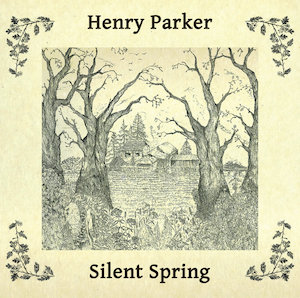 Henry Parker – Silent Spring
Henry Parker – Silent Spring
Self Released – Out Now
If you had told me, in my callow youth, about a young folk singer/guitarist who had started by listening to, and no doubt emulating Black Sabbath, I would not have been surprised. Those were the days (cue violin music) when people didn’t bother about categories, genres or much else and everybody’s record player shared equal time with Sabbath, Fairport, Simon & Garfunkel, Dylan, The Stones or The Beatles (yes there were some tribes). You get the idea anyway. However, leap forward half a century and enter the age of micro-genres, a time when you cannot put your nose out of one musical camp for fear of having it knocked by what’s out there and by where you are.
So, one of the things I love about this reviewing is coming across people who are so far out of their time that I think that there is hope left. Henry Parker is one such case and his album Silent Spring is a great glance back to that period of fifty or so years ago but is also so up to date. Here we have a distillation of all that has gone before in the folk scene of the 1960s and 70s but not so much ‘made contemporary’ as given a lease of life that can help it strike out on its own. Henry is one of a growing number of young performers who have been inspired by Bert Jansch and uses his style as a leaping board into his own exploration of music.
This album reflects a number of styles: sung and instrumental, self-penned and arranged traditional, and electric and acoustic guitar. New Mantras is the right opener, Henry stating that some don’t seem to seek for their own path, for whatever reason, possibly not forcing themselves to look, to try. The singer though will take his own time before he goes his way. He will reflect and move. This dialogue approach to song writing is used again in False Guidance. This song – to himself perhaps – is about the mis-idea that the pursuit of wealth is all-important, that things of value might be missed, and that “greed is the platform to sickness from health”.
Money, or its misuse, is also the subject of Prospect of Wealth. This short track, at 2’30”, designed for the 7” of my childhood no doubt, perfectly encapsulates one the many aspects of folk-influenced – or is it folk-infused – sounds from Henry’s self-confessed infatuation. This time the flute of Theo Travis, which that can be heard on a number of tracks, really brings the added extra.
If you have not already guessed, these songs are autobiographical – what else do we have to call upon but our own experiences. Door Walk Blues says goodbye to the metal band and the metal-band-playing Henry; Drive East are childhood memories of summer holidays on the way to Whitby along the highways of Yorkshire. Here summer is as all our childhood summers, long, bright and warm, celebrated and reflected in the summer of this Albion of a tune.
The two instrumentals allow Henry the chance to expand themes, play with juxtaposition and build lyrical pictures. Marble Wren perfectly reflects the joys of walking along a canal irrespective of the season: three movements in a little over four and a half minutes and you can share the delight. Willie O Winsbury is actually two traditional tunes, the title and preceding it Will Yow Walke The Woods Soe Wylde. A great arrangement but this is on electric guitar and it was at this point that I realised that the Henry Parker sound, pulling what it can from the 60s & 70s, has here that jazz influence as well: the electric guitar, the double bass and the drum, albeit a Morris Drum in this case. It is that bringing together and that freedom of being able to take from what suited, what fitted that makes this album such a joy.
There are so many layers to Silent Spring that it is hard to pull out one that could shine above all others. However, when it comes to something that perhaps gives the right sense, the right essence of the album, it has to be its title and its title track. Rachel Carson’s book continues to make a big impact and in many ways, it is even more important now. Those who read it in 1962 when it was published – perhaps listening to Bob Dylan’s newly-released first album at the same time – clearly did not take it all on board and have left it to Henry’s generation and those beyond to sort out this mess. This track, written for today reminds us of how, through neglect, the situation is now much worse. As an album, Silent Spring may be built on and around the folk-infused music of fifty years ago but its message is very much for today. Henry Parker is clearly an excellent guitarist and writer, but he has also not lost sight of the message. He has found his path. Let us walk that way as well. Excellent.
Silent Spring is available via Bandcamp
https://henryparkermusic.co.uk/
